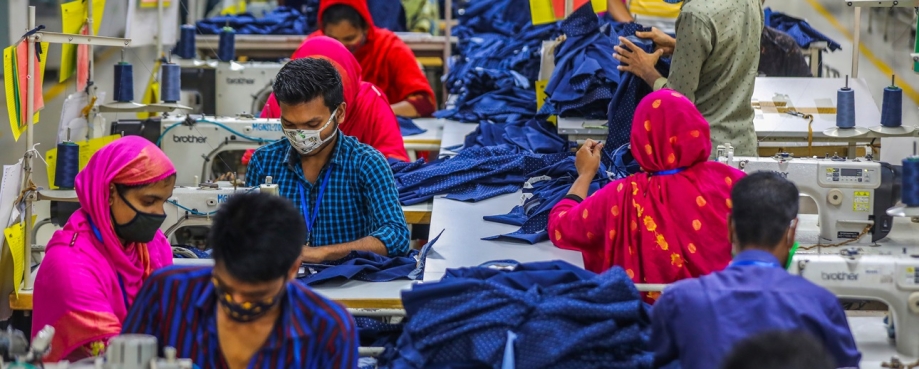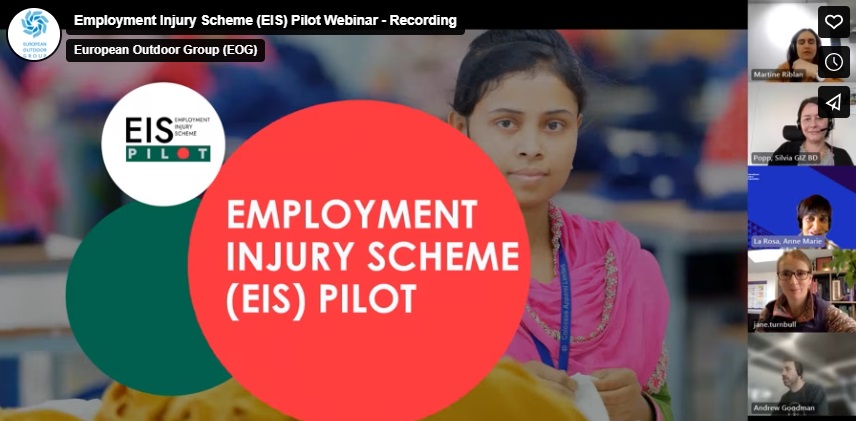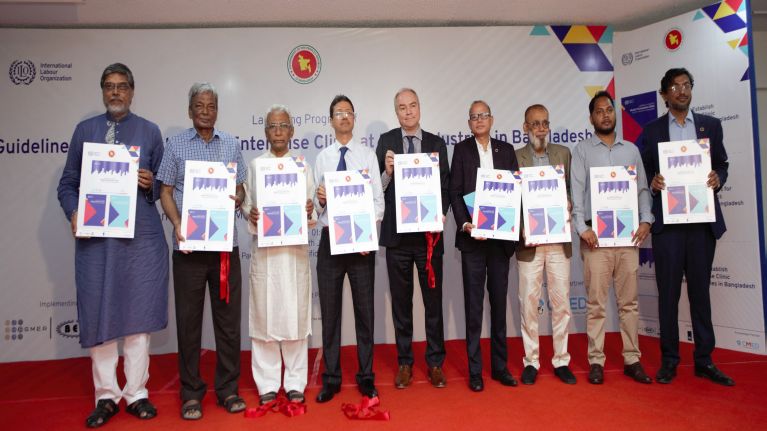NEWS
16
Jan,
2024
By Silvia Popp

The Employment Injury Scheme (EIS Pilot) is a milestone for Bangladesh’s export-oriented ready-made garment (RMG) workers, with the potential to shield them from the financial storm of workplace injuries and death.
01
Jan,
2024
By

Last week, the EOG was joined by the International Labour Organisation (ILO), Giz and Oberalp for a webinar on the Employment Injury Scheme Bangladesh (EIS). This pilot project has been put in place to bring insurance to workers in Bangladesh, and provide them with financial protection in the event of suffering an injury or death while at work.
01
Jan,
2024
By
At DECATHLON, we want to promote social responsibility wherever we play. We believe that the size of our business provides us with the unique opportunity and responsibility to promote safe, healthy and fair working conditions across our value chain and to play our full part in contributing to a fair and equal society.
03
Sep,
2023
By ILO

DHAKA (ILO News) – On 24 June 2023, the International Labor Organization (ILO) and its knowledge partner CMED Health Ltd, along with industry partners BGMEA, BKMEA, and BEF, organized a grand launching event of Handbook and Checklist for establishing model enterprise clinics in Bangladesh’s RMG industries.
The launching event was held at Pan Pacific Sonargaon, chaired by Mr. Eshan –E-Elahi, Secretary, Ministry of Labour and Employment (MoLE), Government of Bangladesh. Distinguished representatives from DGHS, BGMEA, BKMEA, BEF, JSL, NCCWE, and IBC, along with senior officials from various key stakeholders, graced the event with their presence.
During the event, ILO and CMED Health jointly highlighted the development and implementation process of these guidelines to establish ‘Model Enterprise Clinics’ in RMG factories, aligning with the appropriate legislations. The handbook and checklist have been developed through a participatory process with all relevant stakeholders and in collaboration with employers from different factories. To ensure practicality, piloting of the handbook, and checklist, were carried out in 30 RMG factories.
Speaking at the event, Mr Md. Ehsan-E-Elahi, Secretary, Ministry of Labour and Employment, emphasized the importance of this initiative and make it sustainable. He states “The prime responsibility of the Ministry of Labour and Employment (MoLE) is to ensure the welfare of the workers. I believe that this initiative will contribute to the ministry’s (MoLE) vision to improve healthcare for workers.”
Mr Tuomo Poutiainen, Director, ILO-CO-Bangladesh said “The main objective of this initiative is to showcase how enterprise clinics can play an important role in supporting the health of workers and ensuring proper health care at the enterprise level. I hope that the learning from the pilot can be rolled out to all of the RMG industry and beyond.”
Professor Dr Ahmedul Kabir, Additional Director General (Planning & Development), DGHS, mentioned that implementation of the handbook won’t be sustainable if a multisectoral approach can’t be taken.
Representatives of BKMEA and BGMEA have found the handbook and checklist formulation as a much-needed step to ensure equitable healthcare for the workers while also benefitting the factory owners in the long run. The representatives of JSL, NCCWE, and IBC also welcomed the initiatives and made a wish to implement the guidelines at all levels.
The ILO has been working with the Government of Bangladesh and its social partners in improving working conditions and ensuring workers’ social protection through various initiatives since 2013. As part of this process, the handbook and checklist have been developed through a participatory approach, taking inputs from the industry partners and based on the regulations provided in the Bangladesh Labour Law, and Bangladesh Labour Rules.